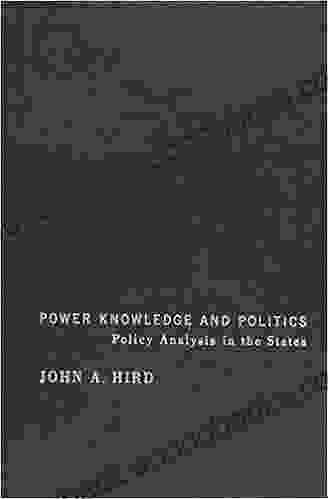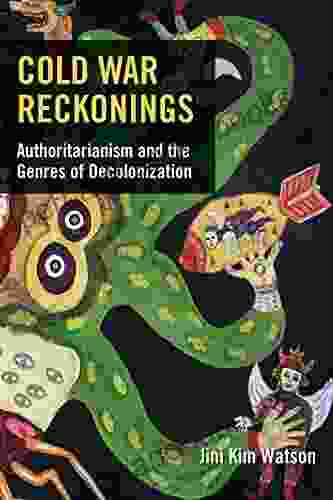Authoritarianism and the Genres of Decolonization: An Exploration of Identity, Power, and Liberation

Decolonization is a complex and multifaceted process that has been taking place for centuries. It is a process that has involved both violent and nonviolent struggles, and it has had a profound impact on the world we live in today.
5 out of 5
| Language | : | English |
| File size | : | 2329 KB |
| Text-to-Speech | : | Enabled |
| Screen Reader | : | Supported |
| Enhanced typesetting | : | Enabled |
| Word Wise | : | Enabled |
| Print length | : | 284 pages |
Authoritarianism is a form of government that is characterized by the concentration of power in the hands of a single person or a small group of people. Authoritarian regimes often use violence and repression to maintain their power, and they often seek to control and suppress dissent.
In recent years, there has been a growing interest in the relationship between authoritarianism and decolonization. This interest has been sparked by the rise of authoritarian regimes in many parts of the world, as well as by the ongoing struggles for decolonization in Africa, Asia, and Latin America.
Authoritarianism and the Genres of Decolonization is a groundbreaking work that examines the ways in which authoritarian regimes have sought to control and suppress the decolonization process. Through a close reading of literary and cultural texts, the book argues that authoritarianism is not simply a form of political oppression, but also a cultural and ideological project that seeks to shape the very ways in which we think about and experience the world.
Authoritarianism and the Control of Narrative
One of the key ways in which authoritarian regimes seek to control the decolonization process is through the control of narrative. Authoritarian regimes often attempt to suppress or distort the accounts of decolonization that are produced by colonized peoples. They do this by controlling the media, by censoring books and other forms of expression, and by rewriting history in ways that serve their own purposes.
The control of narrative is important for authoritarian regimes because it allows them to shape the way that people think about the past, present, and future. By controlling the narrative, authoritarian regimes can create a sense of legitimacy for their own rule, and they can delegitimize the claims of those who oppose them.
In Authoritarianism and the Genres of Decolonization, I argue that the control of narrative is a central feature of authoritarianism. I show how authoritarian regimes have used a variety of genres, including literary genres, historical genres, and journalistic genres, to control the narrative of decolonization.
Authoritarianism and the Production of Identity
Another key way in which authoritarian regimes seek to control the decolonization process is through the production of identity. Authoritarian regimes often attempt to create a sense of national identity that is based on the exclusion of others. They do this by promoting a narrow and exclusive definition of who belongs to the nation, and by excluding those who do not fit into this definition.
The production of identity is important for authoritarian regimes because it allows them to create a sense of unity and solidarity among their supporters. By creating a sense of national identity that is based on the exclusion of others, authoritarian regimes can create a sense of fear and insecurity among those who are excluded. This fear and insecurity can be used to justify the use of violence and repression against those who oppose the regime.
In Authoritarianism and the Genres of Decolonization, I argue that the production of identity is a central feature of authoritarianism. I show how authoritarian regimes have used a variety of genres, including literary genres, visual genres, and performative genres, to produce a sense of national identity that is based on the exclusion of others.
Authoritarianism and the Struggle for Liberation
Despite the efforts of authoritarian regimes to control the decolonization process, the struggle for liberation continues. Colonized peoples have a long history of resistance to authoritarian rule, and they have developed a variety of strategies for fighting for their freedom.
The struggle for liberation is a complex and difficult one, but it is a necessary one. Authoritarianism is a form of oppression that has no place in a just and equitable world. The fight for liberation is a fight for a better future, a future in which all people are free to live with dignity and respect.
In Authoritarianism and the Genres of Decolonization, I conclude by arguing that the struggle for liberation is a struggle for a new world, a world in which authoritarianism is no more. I believe that the insights gained from the study of authoritarianism and decolonization can help us to build a better future, a future in which all people are free.
5 out of 5
| Language | : | English |
| File size | : | 2329 KB |
| Text-to-Speech | : | Enabled |
| Screen Reader | : | Supported |
| Enhanced typesetting | : | Enabled |
| Word Wise | : | Enabled |
| Print length | : | 284 pages |
Do you want to contribute by writing guest posts on this blog?
Please contact us and send us a resume of previous articles that you have written.
 Book
Book Novel
Novel Page
Page Chapter
Chapter Text
Text Story
Story Genre
Genre Reader
Reader Library
Library Paperback
Paperback E-book
E-book Magazine
Magazine Newspaper
Newspaper Paragraph
Paragraph Sentence
Sentence Bookmark
Bookmark Shelf
Shelf Glossary
Glossary Bibliography
Bibliography Foreword
Foreword Preface
Preface Synopsis
Synopsis Annotation
Annotation Footnote
Footnote Manuscript
Manuscript Scroll
Scroll Codex
Codex Tome
Tome Bestseller
Bestseller Classics
Classics Library card
Library card Narrative
Narrative Biography
Biography Autobiography
Autobiography Memoir
Memoir Reference
Reference Encyclopedia
Encyclopedia Shannon Mayer
Shannon Mayer Shaik Bashe
Shaik Bashe Jenny Joseph
Jenny Joseph Michael D Roberts
Michael D Roberts Jerrod S Smelker
Jerrod S Smelker Jeremy Robinson
Jeremy Robinson Nancy L Witherell
Nancy L Witherell Patricia Whitfield
Patricia Whitfield Matthew Shenoda
Matthew Shenoda Mark Graph
Mark Graph Jennie Fields
Jennie Fields Luke Rosiak
Luke Rosiak Jerica Macmillan
Jerica Macmillan Jessica Korn
Jessica Korn Jeffrey Romano
Jeffrey Romano Ji Hyang Padma
Ji Hyang Padma Liza Bakewell
Liza Bakewell Jl Bryan
Jl Bryan Sylvie Richard
Sylvie Richard Joe Minichino
Joe Minichino
Light bulbAdvertise smarter! Our strategic ad space ensures maximum exposure. Reserve your spot today!
 Wayne CarterFollow ·13.4k
Wayne CarterFollow ·13.4k Yasunari KawabataFollow ·6.1k
Yasunari KawabataFollow ·6.1k Austin FordFollow ·4.9k
Austin FordFollow ·4.9k Milan KunderaFollow ·15.9k
Milan KunderaFollow ·15.9k Miguel de CervantesFollow ·14k
Miguel de CervantesFollow ·14k H.G. WellsFollow ·18.9k
H.G. WellsFollow ·18.9k Jeff FosterFollow ·17.6k
Jeff FosterFollow ·17.6k Gary ReedFollow ·15.2k
Gary ReedFollow ·15.2k

 Preston Simmons
Preston SimmonsEmbark on a Literary Odyssey with "Walking on Water": A...
Prepare to be swept...

 Ernesto Sabato
Ernesto SabatoUnlocking Policy Analysis: Dive into the Intricacies of...
: The Realm of Policy...

 Forrest Reed
Forrest ReedThe Road to Grace Walk: A Journey of Spiritual Growth and...
In the tapestry of life, we...

 Evan Simmons
Evan SimmonsTip Neill and the Democratic Century: A Political Odyssey...
The Rise of a Political Giant In the...

 Mark Mitchell
Mark MitchellUnwrap the Magic: A Review of Christmas Memory by Richard...
As the cold winter months draw near, and...

 Percy Bysshe Shelley
Percy Bysshe ShelleyBeyond the Veil: Delve into the Realm of Spirit with In...
Unveiling the Mysteries of the Unseen...
5 out of 5
| Language | : | English |
| File size | : | 2329 KB |
| Text-to-Speech | : | Enabled |
| Screen Reader | : | Supported |
| Enhanced typesetting | : | Enabled |
| Word Wise | : | Enabled |
| Print length | : | 284 pages |












